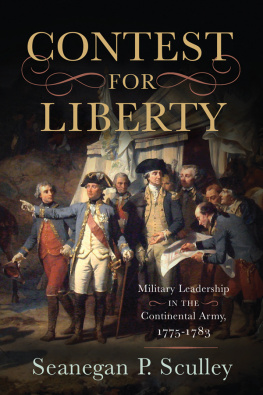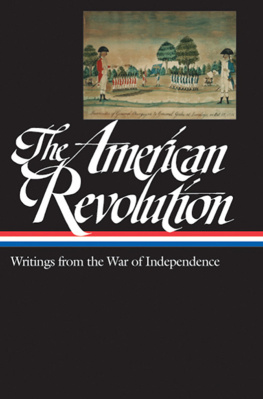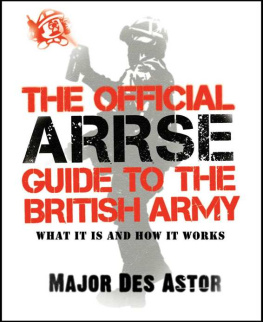AN ARMY DOCTORS
AMERICAN
REVOLUTION
JOURNAL
17751783
AN ARMY DOCTORS
AMERICAN
REVOLUTION
JOURNAL
17751783
JAMES THACHER
Dover Publications, Inc.
Mineola, New York
Copyright
Copyright 2019 by Dover Publications, Inc.
All rights reserved.
Bibliographical Note
This Dover edition, first published in 2019, is an unabridged republication of the work originally published in 1823 by Richardson & Lord, Boston, under the title The American Revolution from the Commencement to the Disbanding of the American Army, Given in the Form of a Daily Journal, with the Exact Dates of All the Important Events. Some historical and biographical material that the author compiled but that was not part of his journal has been omitted from this edition. A new publishers note has been specially prepared for this volume.
Library of Congress Cataloging-in-Publication Data
Names: Thacher, James, 17541844, author.
Title: An Army doctors American Revolution journal, 17751783 / James Thacher.
Other titles: Military journal during the American revolutionary war.
Description: Mineola, New York : Dover Publications, Inc., 2019. | This Dover edition, first published in 2019, is an unabridged republication of the work originally published in 1823 by Richardson & Lord, Boston, under the title The American Revolution from the Commencement to the Disbanding of the American Army, Given in the Form of a Daily Journal, with the Exact Dates of All the Important Events. A new publishers note has been specially prepared for this volume.
Identifiers: LCCN 2018060544 | ISBN 9780486834153 | ISBN 0486834158
Subjects: LCSH: United StatesHistoryRevolution, 17751783Personal narratives. | United StatesHistoryRevolution, 17751783Biography.
Classification: LCC E275 .T356 2019 | DDC 973.3092 [B]dc23
LC record available at https://lccn.loc.gov/2018060544
Manufactured in the United States by LSC Communications
83415801 2019
www.doverpublications.com
Contents
Publishers Note
James Thacher, the son of a Cape Cod farmer, was born in Barnstable, Massachusetts, on February 14, 1754. Interested in a medical career, he was apprenticed at age 16 to a prominent Barnstable doctor, Abner Hersey. As fate would have it, he completed his five-year medical apprenticeship early in 1775, around the time that the momentous events in Lexington and Concordless than 100 miles northwest of Barnstablemarked the start of the American Revolution. Within a few months, Thacher was accepted into the Continental Army as a surgeons mate and started his service to the revolutionary cause at a Cambridge hospital. The long war with England, which would see Thacher promoted to surgeon, took him to many places with different regiments, from Canada to Albany, New York, to West Point, New York, to Middlebrook, New Jersey, where he spent the winter of 177879. Later in 1779, he was in Providence, Boston, New Hampshire, and, finally, back in New Jersey for the winter of 177980. He ended the war participating in the Yorktown campaign. Over a year after the British surrender in Yorktown on October 19, 1781, he resigned from the Army, on January 1, 1783.
Following the war, Thacher established a medical practice in Plymouth, Massachusetts, where he lived for the rest of his life. He married Susannah Hayward of Bridgewater, Massachusetts. They had six children, but only two daughters survived to adulthood. In addition to practicing medicine, he was a prolific author of medical texts that were valuable references for American doctors, including The American New Dispensatory (1810) and American Modern Practice (1817). His American Medical Biography (1828), the first biographical dictionary of American physicians, featured a brief history of medicine in the United States. He also wrote about other topics, including A Practical Treatise on the Management of Bees (1829) and An Essay on Demonology, Ghosts and Apparitions, and Popular Superstitions (1831). His History of the Town of Plymouth (1832) was the first town history published in the United States. In 1803, he was elected to the American Academy of Arts & Sciences.
The book on which his place in American literature rests is An Army Doctors American Revolution Journal, 17751783, first published in Boston in 1823 and reprinted many times throughout the nineteenth century and later. Written with great flair and a sureness of touch unusual in the work of a young writer, it is a curious hybrid of a journal. It records not just the events Thacher participated in and witnessed but also the progress of the war as news reached him wherever he was. Clearly understanding that he was recording events of great importance, Thacher was determined to leave this record of what it was like to be there; to endure the long marches and uncomfortable winters; to be on duty during battles, providing care at fever pitch as best as he could to the endless numbers of casualties; and to live through the sometimes long and dull periods in between. The reader puts the book down with a realistic sense of how news spread during the Revolution, through letters, official reports, and newspapers carried on horseback from one village or military camp to another.
A lively and vital picture of the American Revolution, Thachers journal reaches its highest note with his detailed account of the execution of Major John Andr. In the aftermath of the Benedict Arnold debacle, Major Andr was captured and convicted as a spy. Thacher was present when Major Andr was hanged in Tappan, New York, on October 2, 1780. This extreme punishment was ordered by General George Washington, though many people who knew the personable Major Andr hoped he could be held as a prisoner of war.
John Grafton
Princeton, New Jersey
February 2019
Introduction
It is through your earnest solicitations, my dear friends, that I commit to public inspection the crude fragments recorded in my Military Journal, kept during the American Revolutionary War. The subordinate station which I sustained did not permit access to the great source from which all important events derived their origin; nor was I made acquainted with the views and motives of action. The transactions and occurrences which I shall relate, though of minor import, and penned for temporary amusement, are nevertheless of a nature too deeply interesting to be consigned to oblivion. No circumstance pertaining to our countrys emancipation, but should be embalmed in the memory of our children, and transmitted to the latest posterity, as among the most interesting transactions recorded in the annals of man. When we contemplate the vastly-extended consequences of our revolution, it will be conceded that every incident respecting its rise and progress, and the renowned patriots and heroes by whom it was achieved, is well worthy of perpetual remembrance. With these are associated the primary principles of the rights of man, which so successfully prevailed at the period of our countrys infancy. Those principles, which are the great spring of action in the bosom of the honest patriot, spurn the power and paralyze the hearts of tyrants. The contents of these sheets refer more to details of military manuvres and the internal police of camps, than to projects and events which decide the fate of nations: they may, however, afford amusement to the inquisitive mind, and, to the rising generation, precepts not altogether destitute of importance and useful instruction. They will disclose some interesting particulars, not generally known, and may serve to augment the stock of information developing the fatal policy of the British government, as displayed on






